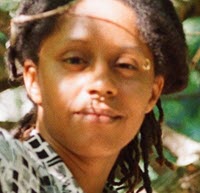Abstract
Excerpted From: Richael Faithful, #BLACKLIVESMATTER Kitchen Talk, 71 National Lawyers Guild Review 246 (Winter 2014 (34 Footnotes) (Full Document)
 Black folk always talk about what some people call the “news.” We are interested in all kinds of news--who died, who's leaving, who's coming, who's sleeping with whom, who got which job, whose kids are grown and what they're doing. We talk about music, culture, and, of course, politics as we know them. In our kitchen-talk, porch-talk, stoop-talk, shop-talk, we say a lot of things that most white folks rarely hear because in these spaces we can be just a little more free or, at least, we face our own judgments of each other, shaped by our racist ecology, rather than carry the unique heaviness of “being Black.”
Black folk always talk about what some people call the “news.” We are interested in all kinds of news--who died, who's leaving, who's coming, who's sleeping with whom, who got which job, whose kids are grown and what they're doing. We talk about music, culture, and, of course, politics as we know them. In our kitchen-talk, porch-talk, stoop-talk, shop-talk, we say a lot of things that most white folks rarely hear because in these spaces we can be just a little more free or, at least, we face our own judgments of each other, shaped by our racist ecology, rather than carry the unique heaviness of “being Black.”
There has been a lot of talk since 2012 when Trayvon Martin was murdered and his killer was legally exonerated. Murmurs swirling around after Troy Davis' execution in 2011 swelled into shouting after the taped murder of Eric Garner by the NYPD. I have been talking about the news with people whom I trust to share my heartache and resilience, including two friends: Zachari Curtis, a Black gender non-conforming DC-native land justice activist and farmer, and Aaliya a queer Desi community-builder in her first year of high school teaching. Some weeks ago the three of us found ourselves in the kitchen as I prepared fixings. Interestingly, we shared some assumptions based on our politics and friendships, yet we had divergent reactions, insights and possibilities about the meaning of now. We turned over, chewed, swallowed, and digested each other's sense of what's happening. We had some kitchen-talk.
As with any kind of intimate talk, we trusted our motivations, appreciated our experiences, assumed nuances, desired openness, and knew that we were just sharing words, not making hard judgments about who we were or could be. Along with a common set of values, we had a shared analysis from which the conversation organically sprung. The topic of #BlackLivesMatter surfaced with our moods as I finished up a meal of tofu scramble and eggless pancakes. It is worth saying that many folks of color do not talk this way with each other, but the people I know do, and some of us are about as frank with our white friends and loved ones. But special permission is given when you are among people who also feel stuck neck-deep in the morose sea of things that you're struggling to describe. At our table, we soon discovered that the sea in which we swam was not equally thick, or high, or of the same substance, among one another or even within the different parts of ourselves, yet, we felt compelled to share the meaning behind the sea of things from our own points of view, right then and there.
Unsurprisingly, we agreed on a lot. Our sense is that the criminal system cannot be relied upon to administer justice for Black folks, and was, in fact, historically designed to control Blacks within a racial caste system. There always seemed to be different rules for definitions of crimes, reasons for arrests, charges to be filed and prosecuted, juries of “peers,” views from the bench, verdicts, sentencing, and the rest since the slave times. Hidden rules for Blacks within the criminal system became even more entrenched when domestic terrorism, like white lynch mobs and the Klan, lost some of its public support. Such “extra-legal” norm enforcement existed through the Slave Codes, the Black Codes, and Jim Crow, which were literally different rules aimed at curtailing Black freedom and codifying subordination. Now, Jimmy Crow (as some have called this current era of racial caste by way of mass incarceration) continues the legacy of different rules for Black folks within a seemingly integrated system of justice. In all these ways we understood that the high-profile murders of Trayvon Martin, Mike Brown, and Eric Garner, and their killers' judicial exonerations, were merely examples of white supremacy operating as usual.
[. . .]
The three of us began drinking fresh tulsi tea. We tacitly resolved that in hindsight, popular history fuels myths exaggerating widespread courage among the aggrieved, just as it does about the goodwill for change among the complicit. It seems like now and then a couple of our bravest contributors are hand-picked and sanitized into heroes while the rest are ultimately decimated by the trials of resistance.
Our bellies and minds were full at this point. We felt better in some ways, troubled in others. We had slogged through that morose sea of things together for an hour. After all, racism is the water in which Americans swim. We did not reach consensus on whether the corporatized civil rights machinery will be redesigned to make room for the new. We did not swap analyses on strategies that will force similar levels of protection for Black, queer and trans folks as for cisgender straight men. We did not agree on whether #BlackLivesMatter is just a political moment or a new liberation movement. Those are talks for another time. The struggle for Black liberation has a very long history and we shared in that history during our meal. We talk. We build. We fight. We love. We work. We try.
Richael Faithful, Esq. is a folk healer and creative based in Washington DC.


